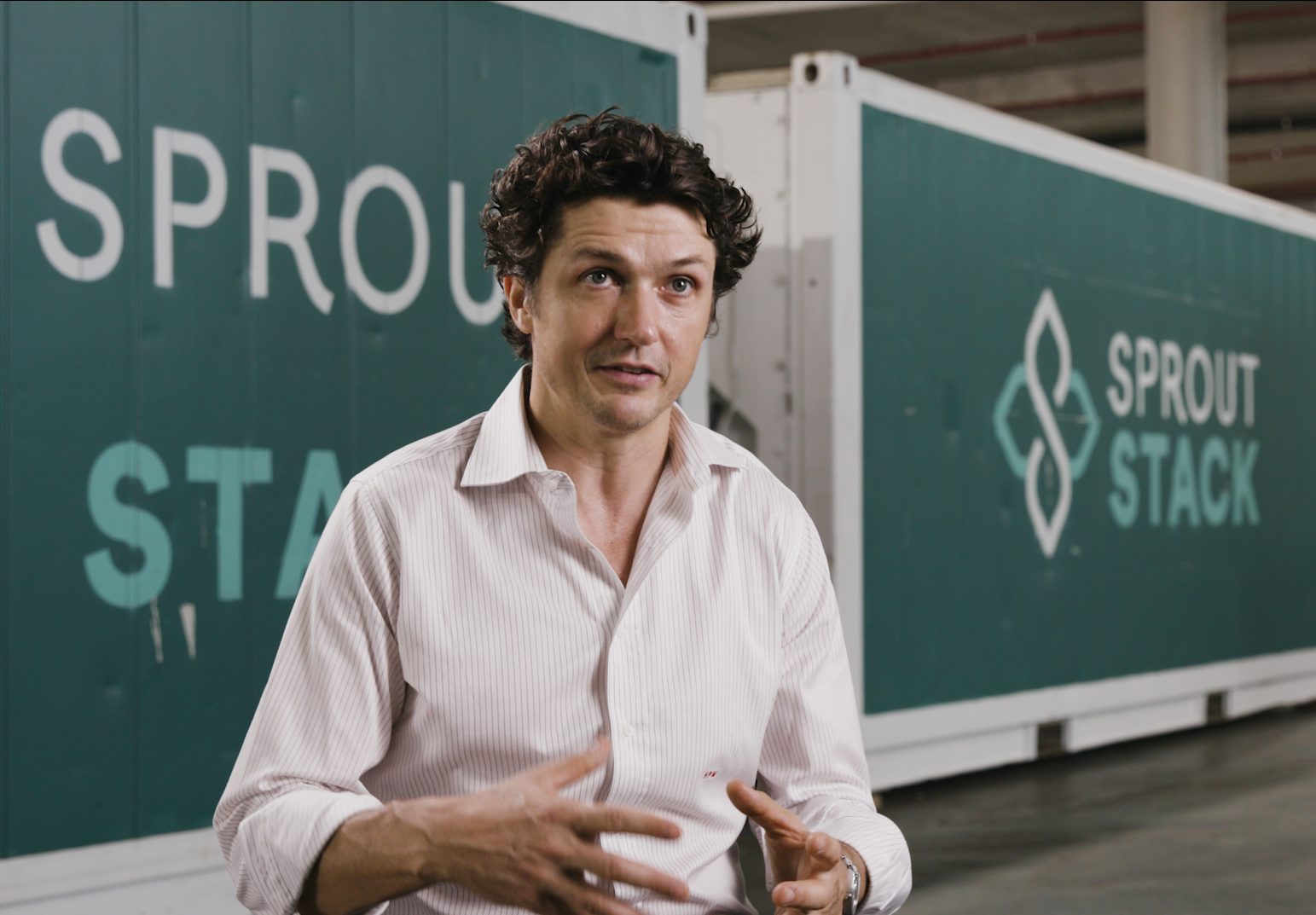It’s business not-quite-as-usual under COVID-19 restrictions, but Sydney-based start-up Sprout Stack, Australia’s only commercial-scale vertical farm, is adapting to the new normal with increased hygiene and safety protocols and forward-looking ‘remote’ research.
Sydney-based ag-tech start-up Sprout Stack, founded in 2016, is Australia’s only commercial-scale vertical farm, growing sustainable salad greens in repurposed shipping containers sited mere kilometres from its target consumers.
Currently, Sprout Stack occupies a cavernous warehouse in Brookvale, on Sydney’s Northern Beaches. Here, they grow the pesticide and herbicide-free lettuce, radish, kale, pea tendrils and amaranth that make up Sprout Stack’s fresh and pre-packaged salad mixes to Harris Farm Markets and independent grocers across Sydney – including Manly Food Co-Op and Harbord Growers Market, both less than half an hour’s drive from base.
“We’re really two businesses,” says company CEO Hugh McGilligan. “One, a farm for the creation of biomass – whatever that biomass may be: salad greens, tomatoes or whatever; and two, a business for the creation of delicious, nutritious, locally grown pre-mixed salads and all that surrounds that – the harvest and packaging of the salad and then delivery. All in 16 hours from farm to store – and we’re aiming to reduce that to 12 and harvest even more frequently.”
Along with cutting its time to market by 25 per cent, Sprout Stack’s keen to expand into cities Australia-wide. And McGilligan has plans to open a commercial-scale vertical facility in Melbourne’s metro area in 2021.
Before all this can happen, though, the company needs to streamline its processes, automate its systems, scale up its operations – and weather the COVID-19 storm.
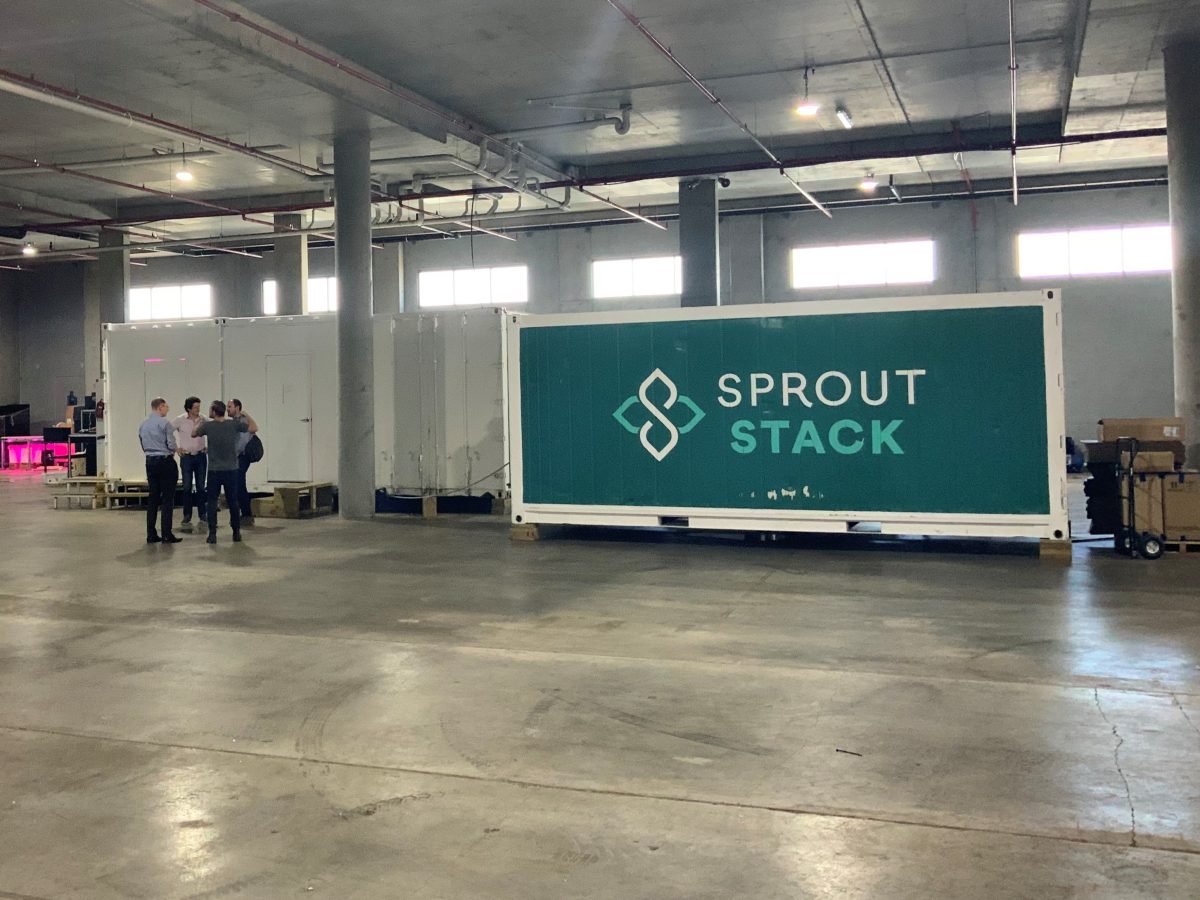
Sprout Stack’s existing facilities are housed in containers parked in a warehouse on Sydney’s Northern Beaches, but McGilligan has plans to expand the vertical farming venture to include similar facilities in other Australian cities. Credit: Tooth & Claw
Scaling up to meet increased demand
With the COVID-19 crisis disrupting supply chains worldwide, Sprout Stack’s sustainable ‘low-food-miles’ production model is helping to give the company a competitive edge. That said, increased demand for fresh, safe local food makes Sprout Stack’s expansion plan more pressing.
“We have a very short supply chain so right now, we’re in the fantastic position of being able to sell everything we produce,” McGilligan explains. “But we’re very much operating at the limits of our capacity.
“About a year ago we were producing around 100 kilograms of salad greens a week. Now, we’re delivering 250–300 kilos a week to our retail partners.
“We’ve grown so far with in-depth research, intuition, and a good deal of trial and error. But none of us are process, manufacturing or mechanical engineers. Now, we need someone to look at our systems with respect to productivity, do ‘time and motion’ studies, et cetera. Because we know that success exists now primarily at the margins.”
“We need expert advice and brilliant engineers so we can scale up significantly and automate [our facility]. We want an independently certified blueprint – a scale-up plan – to raise the financing for our expansion.
“That’s one of the reasons why we joined the Future Food Systems CRC.”
Early in 2020, Sprout Stack entered a formal research collaboration with fellow CRC participant University of NSW. The goal is to develop a plan for scaling up, automating and maximising the efficiency of the company’s systems with a view to expanding its business Australia-wide.
“For the past 18 months, we’ve been honing our production techniques so we can clone the business and shift it to other cities around Australia,” McGilligan says. “The university is helping us to look at ways we can introduce robotics into our vertical growing system to improve efficiency.
“We’re hoping to continue boosting production by four to five times over the next year, without growing our costs by the same amount.”

Sprout Stack is looking to UNSW researchers to help him expand his company’s vertical farming operations in a cost-effective, sustainable way. Credit: Tooth & Claw
Keeping calm and carrying on: business under COVID-19 restrictions
Far from shutting up shop in the face of COVID-19, Sprout Stack is doubling its efforts to keep up with burgeoning demand, while ensuring its food supply – and workers – stay safe.
“At Sprout Stack, we still have ‘boots on the ground’ because as food providers, we’re an ‘essential service’, but of course we now have new protocols in place for social distancing and enhanced worker hygiene,” McGilligan says. “We’ve introduced some pretty advanced hygiene protocols, including physical inspections of all workers involved in the food production and packaging areas of the operation. We’re taking daily temperature checks of all employees pre-work and at work, as an elevated temperature is the clearest indication of whether a staff member is unwell [with COVID-19].
“We’ve also divided our small workforce into five more-or-less separate teams as a safety protocol. On busy days, we typically have a team of 13 – four full-time and seven to nine casuals – now, we are all divided into one of five teams that have only very limited interaction. We’ve separated them in time and place, and they’re not sharing any common areas. So, if someone on one team gets infected with COVID-19 we only have to quarantine a portion of our workforce.
“We took it upon ourselves to do this, exceeding, not just meeting, the specs of the NSW Food Authority,” McGilligan says.
“We can’t afford a shutdown, even for a couple of months. If we get this wrong, we could be out of business.”
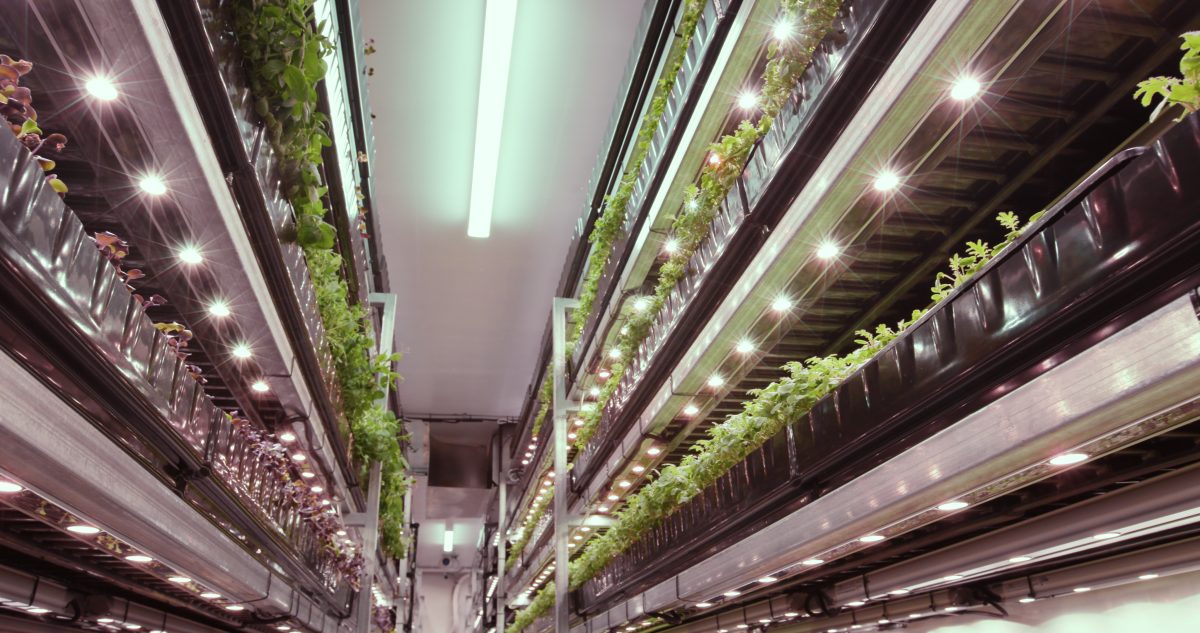
Vertically stacked trays in Sprout Stack’s high-tech container-farm facility on Sydney’s Northern Beaches grow an array of salad greens for pre-packaged mixes sold to retailers across Sydney. Credit: Tooth & Claw
How do consumers know Sprout Stack’s products are safe to eat?
For a start, the business is inspected regularly by Food Standards Australia New Zealand (FSANZ), which ensures that the levels of hygiene and PPE are appropriate. Further, their salads are grown in a controlled environment so they have far fewer opportunities to be exposed to pathogens or other bugs, McGilligan notes. And Sprout Stack’s various salad mixes come pre-packaged and sealed, which consumers tend to view as meaning they’re less likely to be contaminated with coronavirus.
“We also publish our health and safety protocols on our social channels – our enhanced hygiene protocols, et cetera,” he says.
“But really, our good reputation is largely by association. It comes down to the strength of our brand association with Harris Farm and our other partners. Their customers trust their business propositions and we benefit greatly from that trust.”
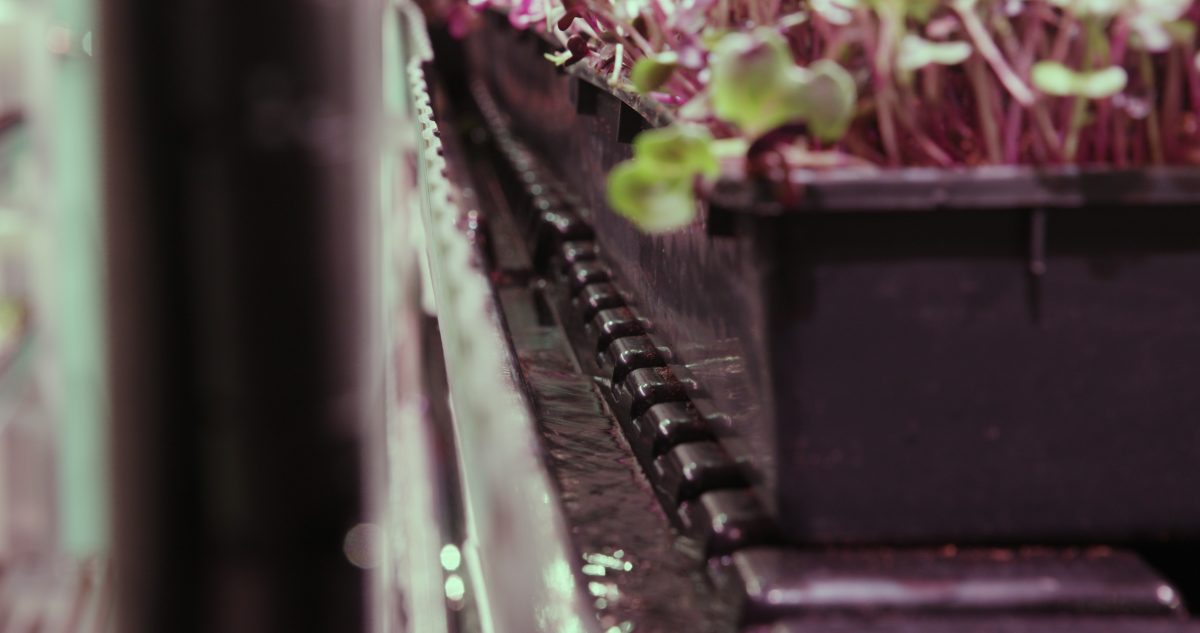
Sprout Stack’s project with University of New South Wales researchers will develop several scale-up options for the company. Credit: Tooth & Claw
Conducting research remotely
Along with producing fresh salad greens for consumers hungry for healthy food, Sprout Stack’s CEO is keen to forge ahead on the research front despite COVID-19 restrictions.
“We were in the midst of developing the expansion project with UNSW when the coronavirus pandemic happened,” McGilligan says.
“Now, we’re faced with the prospect of not being able to conduct the necessary university lab work, at least for the foreseeable future. So the question becomes, ‘How can we conduct this project remotely?’
“For a start, we’ve been having lots of Zoom meetings with the researchers regarding the kind of data they need us to collect and how best to go about collecting it. Sami [Professor Sami Kara}, our lead researcher at UNSW, will then analyse the data at his end.
“Right now, we’re setting up webcams to monitor our programs. Along with this data – and taking into account our goals and KPIs – Sami can then look for inefficiencies and ‘low-hanging fruit’.
The UNSW project team’s analysis will enable them to streamline the production system prior to developing an optimally efficient, sustainable scaled-up version of it.
It was important before the pandemic. Now, it’s even more so. “We have the technology to do this remotely, so why not proceed with the project?” McGilligan says.
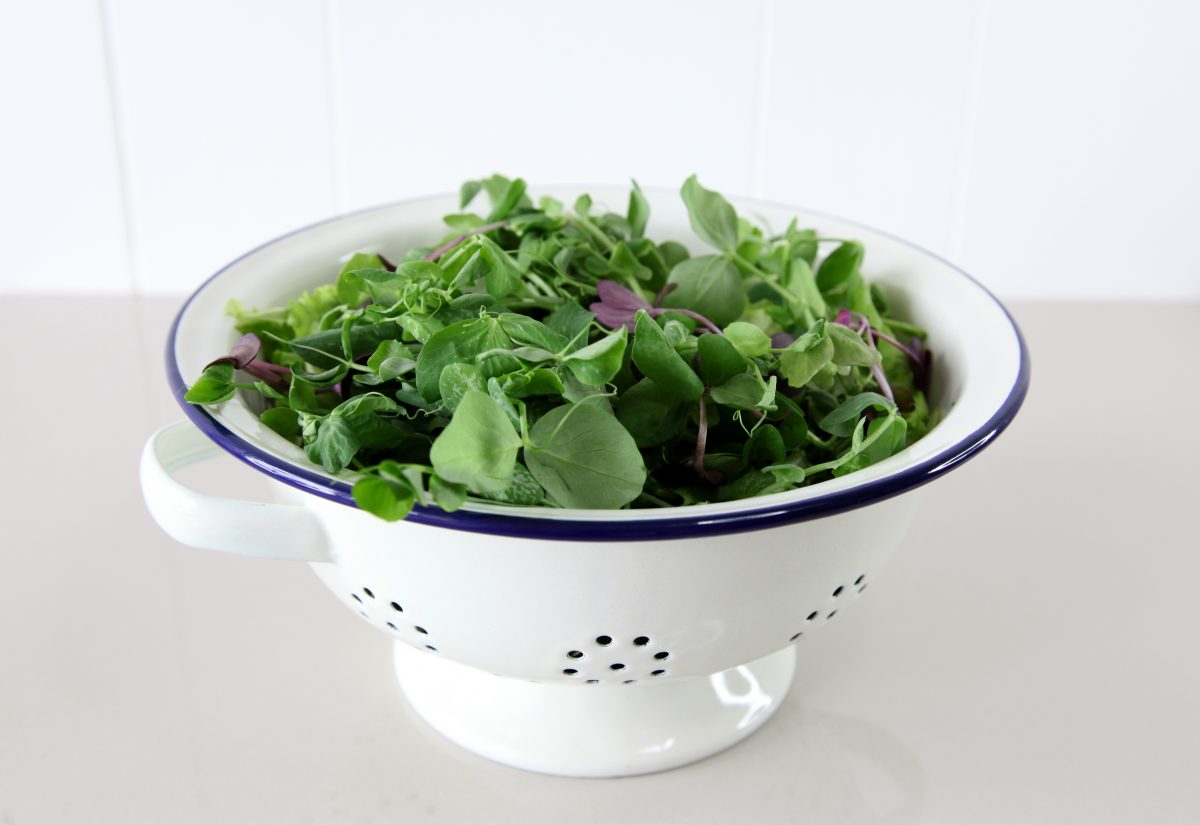
The company’s super-fresh mixed salad greens get from vertical farm to market in just 16 hours. In the post-pandemic world, demand for fresh, safe, healthy food grown close to end consumers is likely to increase. Credit: Tooth & Claw
Lessons from the COVID-19 crisis: looking to the future
The COVID-19 pandemic has taught us that in times of crisis, having a reliable local food supply is vital. Even when this pandemic is over, demand for safe, fresh, locally grown food with proven provenance – already a trend – will likely continue to grow.
And what better way to meet this demand than by creating compact, mobile, scaleable, largely automated vertical farming operations such as Sprout Stack’s?
“We started Sprout Stack partly because of this kind of situation – last summer’s bushfires were an indication, and now there’s this coronavirus pandemic,” says McGilligan.
“We know that long supply chains don’t stack up – our traditional farm production model can’t grow much further. And it doesn’t meet the needs of our largely urbanised global population.
“This sort of system – that is, urban and urban-fringe vertical farming – is increasingly going to be the way to produce food for people in cities around the world.
“Relatively speaking, we can adapt quickly because we can produce around 12 harvests per annum and can build a whole new ‘farm’ in about six weeks.
“Also, we have a very transparent supply chain. We’re all about freshness and quality.”
While noting that, McGilligan is of the firm belief that many more of us will be eating vertically grown food in the future.
“UK supermarkets have already made a big investment into [vertical farming], introducing vertical farms within supermarkets’ own distribution centres. Equally, Plenty, a vertical farm [in the US] has had massive investment from Softbank and from Amazon founder Jeff Bezos.
Australia is far from short of arable land, so don’t expect vertical operations to replace broadacre farms or orchards anytime soon. But urban and peri-urban vertical farms will undoubtedly play a key role in feeding our growing global population going forward. And though currently, only a small selection of horticultural crops can be produced in vertical farms, this will change with advances in technology, McGilligan contends.
“Right now, vertical farming methods are best suited to high-churn, high-value-add produce that degrades quickly – so leafy greens and, potentially, berries.
“However, the scope [for growing other crops] will increase as the costs come down, particularly for energy and LEDs,” he says.
“It’s a long game but the technology is catching up fast.
“And nowadays, people are a lot more amenable to the idea of paying a bit more to ensure they’re getting a sustainable, provenance-proven product.”


